
There are many people in human history who have enacted an international impact in how society will change for the better. Dr. Martin Luther King Jr. was one man who changed history forever. He sacrificed his time and his life for social and racial justice. He believed in equality for all human life and he wanted economic justice too. Also, he wasn't just a civil rights leader. He was a man with great intellect, he had a great sense of humor (as attested by his family and friends), and he loved to inspire others to reach their highest potential. We honor his contributions that justly and rightfully helped humanity. He was born in Atlanta, Georgia on January 15, 1929. His father, grandfather, and great grandfather were preachers. His father was Martin Luther King Sr., who was stern and a person who wanted his children to express a steadfastness against injustice. His mother was Alberta Williams King. She believed in equality and instilled great values in her children too. His father opposed injustice and he was a well-known preacher in Atlanta’s Ebenezer Baptist Church. Dr. Martin Luther King Sr. was an active proponent of racial justice in Atlanta, Georgia. Dr. Martin Luther King Jr.'s middle class childhood was filled with experiences of accomplishments, joy, tragedy, and racism. He was forced to stand up in a bus (because of Jim Crow laws) after he was involved in a childhood academic competition (he said that the incident was the time when he felt the most angry in his life). He saw his father experiencing racism.
Dr. Martin Luther King Jr. played sports (like football and basketball) and he was gifted with great intelligence. He graduated from Booker T. Washington high school at the age of 15 and he went to Morehouse College in September 20, 1944 in Atlanta. 2 years later, he published a letter to the Atlanta Constitution that stated that black people “are entitled to the basic rights and opportunities of American citizens.” Dr. King decided to be a minister and delivered his first prepared sermon in the Ebenezer Baptist Church in Atlanta during the Summer of 1947. He was 18 years old. He was ordained and appointed assistant pastor at Ebenezer Baptist Church in Atlanta in February 25, 1948. He was naturally gifted to be a great orator. He received his Bachelor of Arts degree in sociology from Morehouse College in June 8, 1948. Later, Dr. Martin Luther King Jr. studied theology in Crozer Theological Seminary in Chester, Pennsylvania and in Boston. In these universities, he believed in Personalism and he questioned capitalism in his letters. He loved to synthesize information. In other words, he evaluated philosophies in a meticulous fashion.


Early Life
Around this time, he met Coretta Scott King. Coretta Scott King was from Alabama. She was her own woman and a great singer. Coretta Scott King was a political activist too who believed in peace, nuclear disarmament, and civil rights for decades. She wanted to be a singer and she at first wasn’t initially attracted to Dr. King until Dr. King shown his intellect about politics, civil rights, economics, etc. They both were very intelligent and they loved each other. Both of them married at the Scott home near Marion, Alabama in June 18, 1953. The Brown v. Board of Education decision in 1954 and the evil murder of Emmett Till in 1955 galvanized even more people in America to stand up and fight back against oppression in the Deep South and throughout the Earth. In 1954, he was a preacher in Dexter Avenue Baptist Church in Montgomery, Alabama. The Montgomery Bus Boycott came about and King was chosen as President of the Montgomery Improvement Association or the MIA. He was chosen since he was new to Montgomery and he wasn't tied up in the city's politics so strongly.


Dr. King was transformed into unconditionally supporting Gandhian nonviolence (as he once owned a gun in his home and he had armed bodyguards with him. Bayard Rustin was one man who inspired him especially to advance the pacifist action of nonviolence). He was influenced by black people, white liberal theologians, pacifists, Gandhi, and tons of other social activists who inspired him. Dr. Martin Luther King Jr. was a pacifist, a Baptist clergyman, and he criticized capitalism. He spoke positively about democratic socialism. By the late 1950’s, Dr. King traveled the country to speak in favor of civil rights. He traveled into Ghana (with his wife Coretta Scott King) to celebrate its independence from colonialism. Ghana's independence was very important since it signified the beginning of the end of overt colonialism in the Motherland of Africa. He traveled with Coretta Scott King into India to study India and the nonviolent philosophy. By the late 1950's, the SCLC or the Southern Christian Leadership Council was established in order to create voter registration, to fight poverty, to build education, to promote workers' rights, and to ultimately end Jim Crow. In February 18, 1957, Dr. Martin Luther King Jr. was featured on the cover of TIME's magazine. Dr. King's book "Stride Toward Freedom: The Montgomery Story" was published by September 17, 1957. The late 1950's saw a not very strong Civil Rights bill passed and the evil of McCarthyism flourishing, but activism for change continued unabated.
Dr. King was the President of the SCLC for the rest of his life. The SCLC organization moved from Montgomery to Atlanta in 1960. In February 1, 1960, the modern sit in movement existed in Greensboro, North Carolina (though sit-ins existed long before 1960) by young black college students (their names are David Richmond, Franklin McCain, Ezell Blair, Jr., and Joseph McNeil). The sit-in happened in the Woolworths restaurant. In February 1960, Dr. Martin Luther King Jr. and his family moved into Atlanta where he served as assistant pastor to his father at Ebenezer Baptist Church.


In 1960, Dr. Martin Luther King Jr. met privately with then Presidential candidate John F. Kennedy. JFK won the election with the majority of the black vote, because he spoke in favor of civil rights. Yet, for most his Presidency, JFK would act slow or in a gradual fashion on civil rights matters. Dr. Martin Luther King Jr. would at times publicly criticize JFK for his slow, moderate response to civil rights issues too. He or the President JFK would advocate a Civil Rights Bill in June of 1963 (after he was pressured by social activists to do something about what was going on in Birmingham, etc.). The beginning of the 1960’s saw more sit-ins in stores and the Freedom Riders developed (The Freedom Riders were people who wanted to integrate bus terminals). The Freedom Riders wanted to enforce existing integration laws on interstate bus travel. Attorney General Robert Kennedy during the early 1960's had a contentious, angry relationship with the Freedom Riders and the civil rights movement since RFK wanted to use the law to solve problems without massive demonstrations. RFK was wrong since an unjust law is no law at all and any person has the right to express demonstrations and use militant action in fighting oppression. The May 24, 1963 meeting between Attorney General Robert Kennedy and black civil rights activists (like James Baldwin, Harry Bealafone, Lorraine Hansberry, Jerome Smith) was antagonistic as RFK wanted a more moderate approach to try to solve racial discrimination in America. The civil rights activists wanted RFK to see that token moderation is no solution and that revolutionary action is necessary to establish justice for black people. By the late 1960's, Robert Kennedy changed and became more progressive on issues (to his credit. RFK by the late 1960's would oppose apartheid, support gun control, and opposed LBJ's policies involving the Vietnam War).


Ultimately, Dr. King learned lessons from his experience in Albany in order for him to do much better in the Birmingham campaign. In 1963, Dr. Martin Luther King worked in Birmingham, Alabama (which was heavily segregated, racist, and black people faced massive oppression) to fight segregation, discrimination, racism, poverty, and economic deprivation in general. Pastor Frederick Lee "Fred" Shuttlesworth was one of the many leaders of the Birmingham movement. He suffered assaults and other injustices, but he continued forth as a man to stand up for his human rights. He promoted demonstrations and was jailed in April of 1963. Dr. King wrote the famous “Letter from a Birmingham Jail” while he was in a Birmingham jail to refute moderate Jewish and Christian clergymen (who wanted Dr. King to be patient and be a token moderate in waiting for change). Dr. King’s letter was eloquent and refuted their words. In that letter, Dr. King wrote that waiting for justice is not feasible since a person's freedom should never be given based upon time. Freedom ought to be enacted by birthright and immediately since all people are born free and all people are created equal. In May 7, 1963, the racist Bull Connor (the Police Commissioner) used police dogs, clubs, water hoses, and cattle prods to brutalize and harm black men, women, and children protesters in downtown Birmingham. This caused outrage worldwide. On June 12, 1963, Civil Rights Leader Medgar Evers (who advocated social justice and voting rights) was assassinated in front of his home in Jackson, Mississippi.

"...But one hundred years later, the Negro still is not free. One hundred years later, the life of the Negro is still sadly crippled by the manacles of segregation and the chains of discrimination. One hundred years later, the Negro lives on a lonely island of poverty in the midst of a vast ocean of material prosperity. One hundred years later, the Negro is still languished in the corners of American society and finds himself an exile in his own land. And so we've come here today to dramatize a shameful condition...I have a dream that my four little children will one day live in a nation where they will not be judged by the color of their skin but by the content of their character. I have a dream today!..And when this happens, and when we allow freedom ring, when we let it ring from every village and every hamlet, from every state and every city, we will be able to speed up that day when all of God's children, black men and white men, Jews and Gentiles, Protestants and Catholics, will be able to join hands and sing in the words of the old Negro spiritual: Free at last! Free at last! Thank God Almighty, we are free at last!"
After the march, he and other civil rights leaders visited President John F. Kennedy and Vice President Lyndon Johnson. Dr. King published his second book entitled, "The Strength to Love" on September 1, 1963. In the midst of such profound inspiration, comes more tragedy. On September 15, 1963, four innocent little girls were killed by white racists as a product of the bombing of the Sixteenth Street Baptist Church in Birmingham. Their names are Addie Mae Collins, Carol Denise McNair, Carole Robertson, and Cynthia Dianne Wesley. These little girls just wanted to worship God peacefully.
Dr. King delivered the eulogy. Angela Davis and Condoleezza Rice knew the four victims. In October 10, 1963, U.S. Attorney General Robert Kennedy authorized the FBI to wiretap King’s home phone, which was wrong. JFK would be assassinated in November 22, 1963 in the midst of him moving in a more progressive direction as compared to 1961. Time Magazine called Dr. Martin Luther King Jr. “Man of the Year” on January 3, 1964. Dr. King continued onward. He supported the War on Poverty. He fought for change in St. Augustine, Florida. He also met Malcolm X for the first and only time in the Washington, D.C. Congress building in March 26, 1964. Both of them were monitoring the Congressional debates on the Civil Rights Bill. In June 4, 1964, Dr. Martin Luther King Jr. published his third book called, "Why We Can't Wait." He supported the group of CORE including the SCLC individuals organizing the Mississippi Freedom Summer campaign (which wanted black people in Mississippi to vote by registration and they wanted to end racial injustice. This happened during the Summer of 1964. Freedom Summer included both black and white young people who worked together in solidarity in desiring equality, freedom, and justice). The FBI via Hoover slandered the civil rights movement as Communist inspired, which was a slander. The movement for black liberation existed long before Karl Marx was ever born. Hoover was the ultimate hypocrite since he lectured others on law and integrity, but he executed illegal surveillance against people who disagreed with his backward political views.

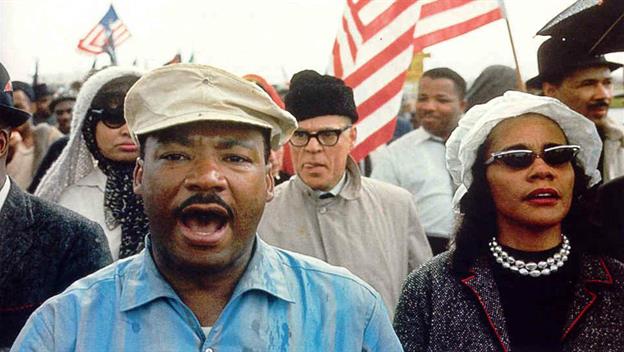
Dr. Martin Luther King Jr. received the Nobel Peace Prize at a ceremony in Oslo, Norway in December 10, 1964 (for the cause of civil rights in advancement of nonviolence). He sent every penny of the $54,000 award to the civil rights movement. Coretta Scott King was there with him in Norway as well. Back in the States, Dr. King worked in Selma to fight for voting rights by early 1965. The movement of Selma, Alabama is the peak of the mainstream civil rights movement of the 1960’s in terms of collective unity among organizations. Malcolm X, James Forman, Coretta Scott King, John Lewis, Amelia Platts Boynton Robinson, and others supported the Selma voting rights movement. Dr. Martin Luther King Jr. and Malcolm X were great people of the black freedom movement. They disagreed on nonviolence. Malcolm X believed in self-defense and he refused to be a pacifist in the face of white racist terrorism. Malcolm X was a famous leader in the Nation of Islam (in that organization, he believed in a separate black state, he denounced the civil rights movement, and he spoke courageously against police brutality) and he left in 1964. He left Elijah Muhammad, because Malcolm X believed that the NOI in his mind was not doing enough in terms of political activism to cause real social change for black people (and because of the accusations of Elijah Muhammad committing adultery, etc.). Malcolm X felt betrayed. After his Hajj, Malcolm X was changed forever. He believed in judging a person on a person’s conscious behavior not on skin color. He formed Muslim Mosque Inc. to accept Muslims in the course of spiritual matters. In 1965, Malcolm X said that he didn't believe in segregation and he believed in freedom for black people along with the right of self defense.
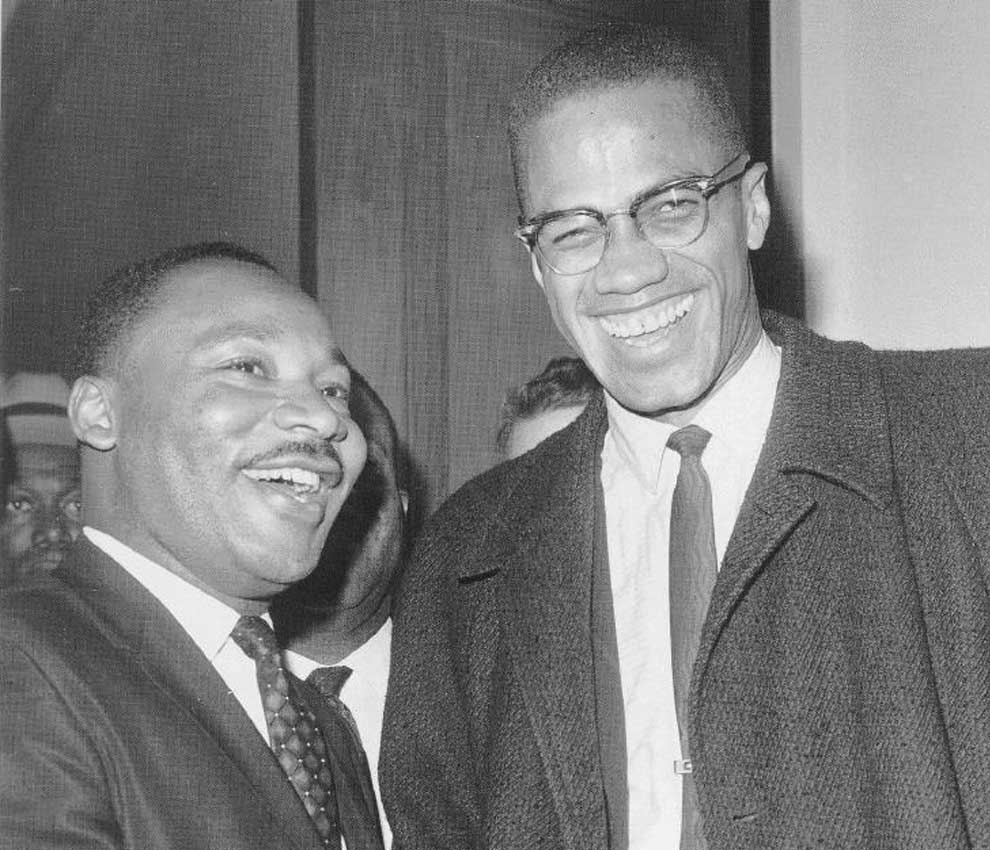

Bloody Sunday happened in Selma when the police brutalized innocent protesters at the Edmund Pettis Bridge in Selma. They or the marchers tried to march to Montgomery. Dr. King didn’t go into the next march across the bridge, but he did after the judge ended the injunction and allowed demonstrations to conduct their march to the Capitol of Alabama. Dr. King gave a great speech in Montgomery, Alabama after the third successful march. The Voting Rights Act was signed in August 6, 1965.

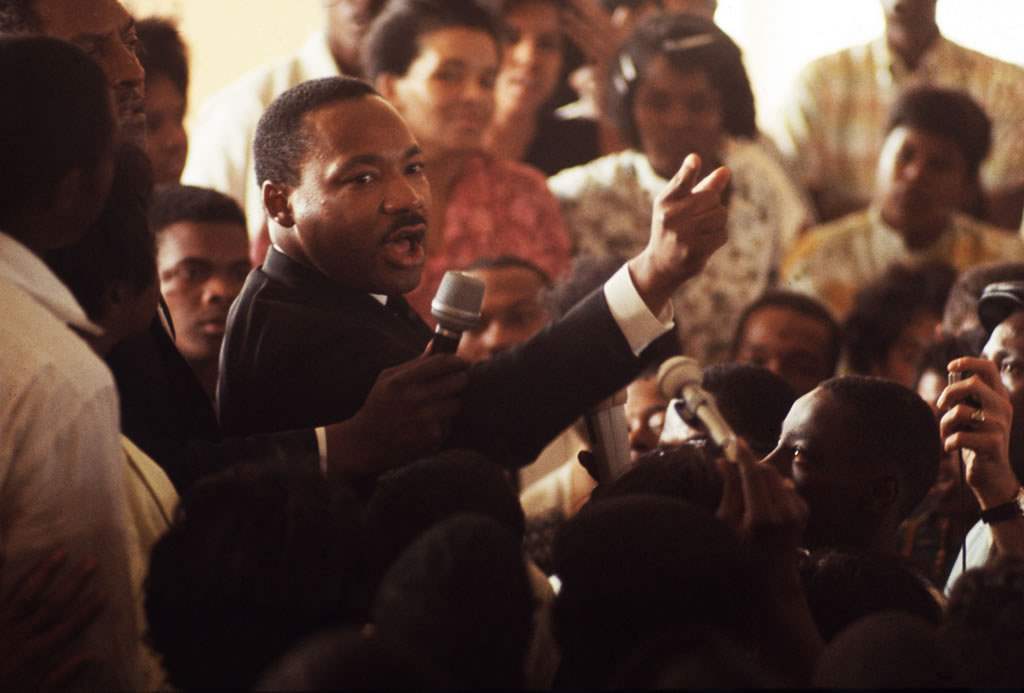

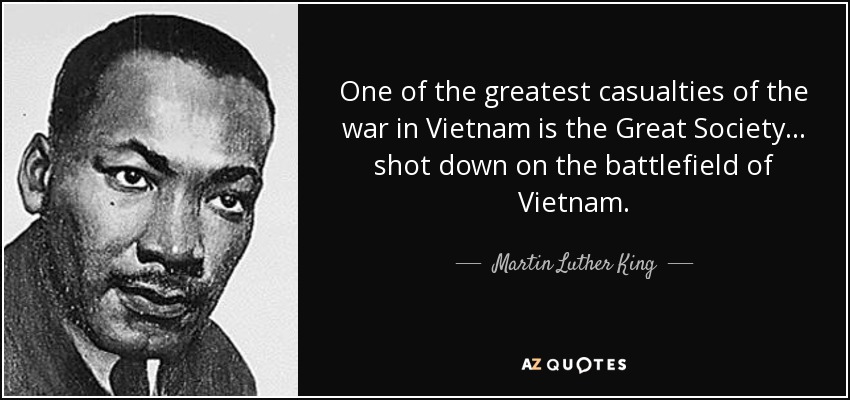
Dr. Martin Luther King Jr. issued public statements against the Vietnam War as early as 1965. He took a vacation in Jamaica in January 1967 in order for him to relax and work on his final book entitled, "Where do we go from Here?" In Jamaica, he talked with Bevel and later after seeing images of napalmed Vietnamese children in the Rampant magazine, he fully was dedicated to oppose that evil, unjust war in Vietnam. He returned into the States from Jamaica with a firm determination. By early 1967, he opposed the Vietnam War in public in a higher level. He was later heavily criticized by the moderate civil rights leaders, by the President Lyndon Baines Johnson, by far right reactionaries (who have a morbid fear of Communism instead of a love of racial justice), and by the mainstream media for his anti-war stance. He continued onward regardless. Whitney Young and Dr. King had an argument about the war in Long Island, NY. Later, both men would continue their discussion. Whitney Young would continue to support the war until after Dr. King's assassination. He gave his famous “Beyond Vietnam” speech to a group of Clergy and Laymen Concerned about Vietnam at Riverside Church in New York City on April 4, 1967, which as one year to the day before his assassination. He wanted the U.S. to end the Vietnam war and send U.S. troops home. In that speech in Riverside Church, he condemned the anti-religious liberty actions of Diem (who brutalized Buddhists. He also condemned the corrupt General Ky). Dr. Martin Luther King Jr. condemned the United States government as the greatest purveyor of violence in the world. He wanted an end to militarism, materialism, economic exploitation, and racism. He wanted colonialism to end and he desired capitalistic exploitation to cease. Here is part of that courageous, historic speech which was said in NYC:
"Somehow this madness must cease. We must stop now. I speak as a child of God and brother to the suffering poor of Vietnam. I speak for those whose land is being laid waste, whose homes are being destroyed, whose culture is being subverted. I speak for the poor of America who are paying the double price of smashed hopes at home, and death and corruption in Vietnam. I speak as a citizen of the world, for the world as it stands aghast at the path we have taken. I speak as one who loves America, to the leaders of our own nation: The great initiative in this war is ours; the initiative to stop it must be ours. A true revolution of values will lay hands on the world order and say of war, 'This way of settling differences is not just.' This business of burning human beings with napalm, of filling our nation's homes with orphans and widows, of injecting poisonous drugs of hate into the veins of peoples normally humane, of sending menhome from dark and bloody battlefields physically handicapped and psychologically deranged, cannot be reconciled with wisdom, justice, and love. A nation that continues year after year to spend more money on military defense than on programs of social uplift is approaching spiritual death."
-A Time to Break Silence, Speech by Rev. Dr. Martin Luther King Jr. April 4, 1967
Immediately after Dr. King's historic Riverside Church speech in New York City, the political and media establishment harshly and unfairly criticized Dr. King. One editorial from the NY Times criticizing Dr. King for trying to unite the peace and civil rights movements. Someone from the Washington Post criticized him. Life magazine slandered him too. Carl Rowan (he was a black man with ties to the United States Information Agency) in reader's Digest criticized Dr. King for his views on opposing the Vietnam War. The leadership of the NAACP was pro-Vietnam War (like Roy Wilkins until after Dr. King was assassinated) and they didn't want to make waves against Lyndon Baines Johnson. Yet, Dr. Martin Luther King Jr. was courageous to stick by his anti-war convictions and he refused to back down. Dr. King answered the press's questions about his opposition to the Vietnam War. He goes from NYC to Los Angeles, San Francisco. By April 14, 1967, Dr. King goes into Palo Alto, California where he gives a speech. He later participates in the Mobilization March from Central Park to the United Nations.
Many people like Levison (his close adviser) didn't want him to go to the march because they didn't want him associated with those deemed more "radical" like Kwame Ture and other anti-war activists. Dr. King takes James Bevel's advice to join the Mobilization March. Dr. King on April 15, 1967 participated in the march with Harry Belafonte, Kwame Ture, Dr. Benjamin Spock, and Dave Dellinger. The protesters numbered in 125,000 people. Kwame Ture gave his speech. The crowd marched to the United Nations and Dr. King also gives a speech in front of the United Nations building. He encourages people to be a conscientious objector. On April 30, 1967, Dr. King gave his historic "Why I am Opposed to the Vietnam War" speech in Ebenezer Baptist Church in Atlanta, Georgia. Dr. King invited Kwame Ture to the church and he agrees to come. After the speech, Kwame Ture applauded Dr. King heroic, courageous words. Dr. King spoke the following words in the sermon on April 30, 1967:
"...For the sake of those boys, for the sake of this government, for the sake of the hundreds of thousands trembling under our violence I cannot be silent. Been a lot of applauding over the last few years. They applauded our total movement; they've applauded me.] America and most of its newspapers applauded me in Montgomery. And I stood before thousands of Negroes getting ready to riot when my home was bombed and said, we can't do it this way. They applauded us in the sit-in movement--we non-violently decided to sit in at lunch counters. The applauded us on the Freedom Rides when we accepted blows without retaliation. They praised us in Albany and Birmingham and Selma, Alabama. Oh, the press was so noble in its applause, and so noble in its praise when I was saying, Be non-violent toward Bull Connor; [when I was saying, Be non-violent toward [Selma, Alabama segregationist sheriff Jim Clark. There's something strangely inconsistent about a nation and a press that will praise you when you say, Be non-violent toward Jim Clark, but will curse and damn you when you say, "Be non-violent toward little brown Vietnamese children. There's something wrong with that press!...With this faith we will be able to speed up the day when justice will roll down like waters, and righteousness like a mighty stream. With this faith we will be able to speed up the day when the lion and the lamb will lie down together, and every man will sit under his own vine and fig tree, and none shall be afraid because the words of the Lord have spoken it. With this faith we will be able to speed up the day when all over the world we will be able to join hands and sing in the words of the old Negro spiritual, "Free at last! Free at last! Thank God Almighty, we're free at last!" With this faith, we'll sing it as we're getting ready to sing it now. Men will beat their swords into plowshares and their spears into pruning hooks. And nations will not rise up against nations, neither shall they study war anymore. And I don't know about you, I ain't gonna study war no more."
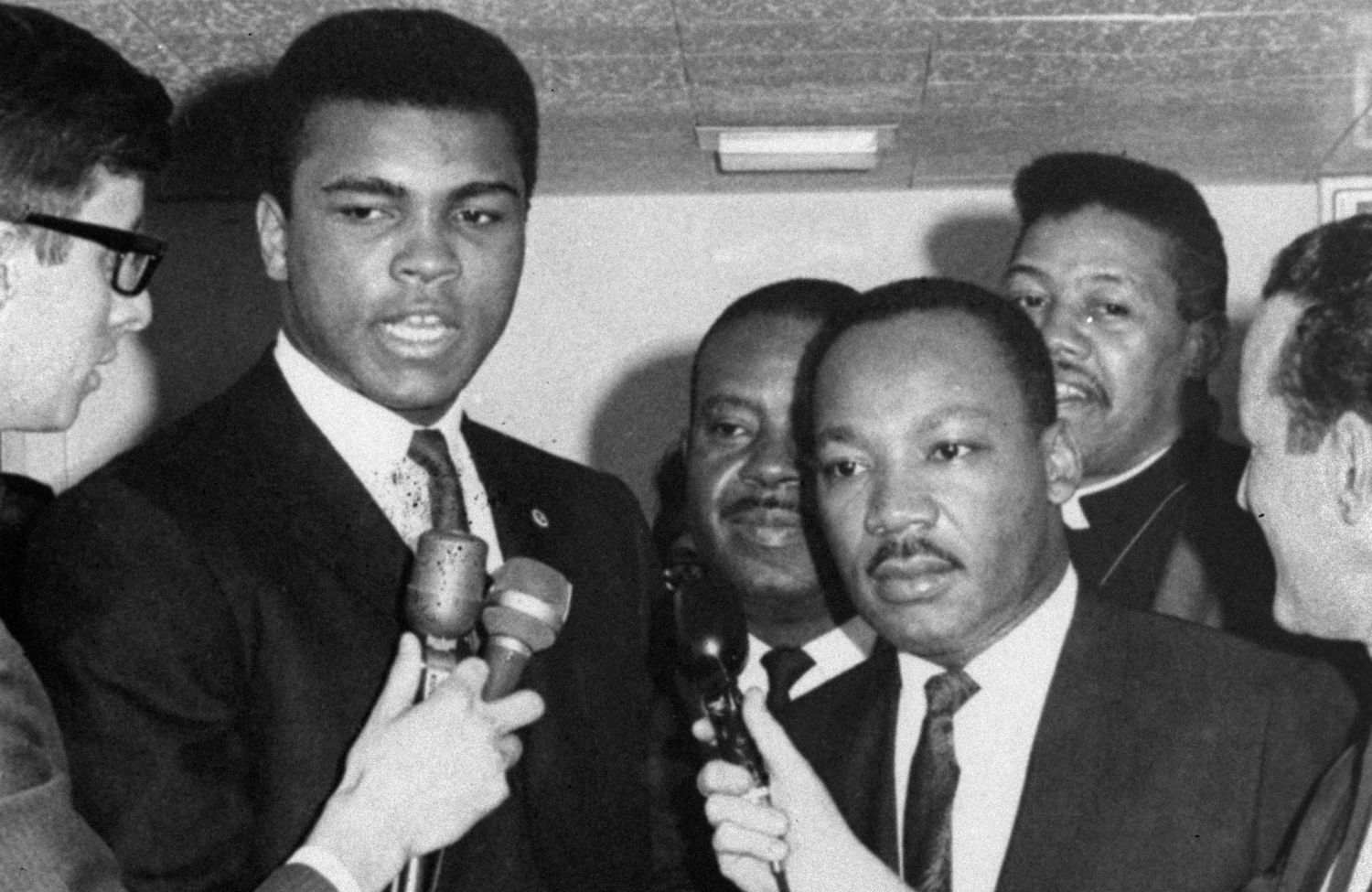
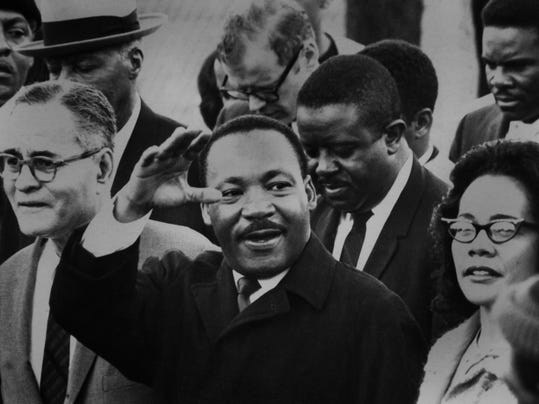
Dr. Martin Luther King Jr. was a constant traveler. He used jets and planes constantly to travel nationwide and worldwide to spread his message of peace, justice, and nonviolence. Dr. King traveled into Louisville, Kentucky on May 10, 1967 to join with his younger brother A.D. King (and others) to fight housing discrimination. Many landlords were discriminating against people based upon race and that is wrong. He told 75 white people in Louisville's South End to promote equality. The whites there became angry and almost hit him with a rock. Photojournalist Ken Rowland provided more context to the encounter in “Freedom on the Border: An Oral History of the Civil Rights Movement in Kentucky,” a collection by Catherine Fosl and Tracy E. K’Meyer. Rowland was at the corner of Central and Taylor, waiting for King to arrive, when King’s car pulled up and he began speaking to two little white girls.
Rowland mentioned this information: “And all of a sudden, one of the kids spit at King. Little white girl. Neighborhood kids. And one little girl said, “I hate you.” And I heard King say, “I love you.” The rock (that almost hit Dr. King) fell into the car, and King took it with him to the podium, where he addressed a West End church later that night, saying “Upon this rock, we are going to build an open city.”
By the end of 1967, Louisville would finally pass an open housing ordinance. Frankfort (in KY) would do the same in 1968. Louisville is Muhammad Ali's hometown. By this time, Ali is overtly against the Vietnam War and Dr. King supports his decision. Both Muhammad Ali and Dr. King were friends.
By the third week of May 1967, he traveled into South Carolina (from Savannah, Georgia. Tom Barnwell greets him). He came into St. Helena Island as a place to relax and discuss strategy with the SCLC. About 70 SCLC staff members were there. There are young people there who want changes. In the meeting, Frieda Mitchell talked to Dr. King. She was a teacher who would be the first black school board member of Deaufort County, South Carolina (in Penn Center). She talks about her unjust mistreatment by racists and Dr. King inspires her. Other members in the discussion debate tactics, money, and some want to just focus on the Poor People's Campaign. In the meeting, Dr. King warned that the road ahead would be much harder.
“It is necessary for us to realize that we have moved from the era of civil rights to the era of human rights ... when you deal with human rights, you are not dealing with something clearly defined in the Constitution,” Burton quotes King as saying at Penn in May 1967. “They are rights that are clearly defined by the mandates of humanitarian concern ... We are talking about a good, solid, well-paying job. We are talking about a good, sound, sanitary house. We are talking not merely about desegregated education, but we are talking about quality education.”
The early Six Day War in the Middle East of June of 1967 shocked the world. Israel executed a quick preemptive strike against Egyptian plus other Muslim forces. Israel receives an easy victory in a matter of days. Many people celebrate and others don't. Egypt, Jordan, Iraq, and Syria were defeated. It also relates to the African American and Jewish relationship in America. Many black people and Jewish people were united in civil rights. Yet, many younger black people viewed Israel with suspicion and view it as an imperial force against Palestinians. One person who believed in this view was of course Kwame Ture. Christian theologians signed a document calling for Johnson to back Israel. Yet, Dr. King (in private) said that he didn't read the text and he wouldn't have signed it if he known of its contents. FBI wiretaps recorded this conversation with his ally Stanley Levison. On June 6, 1967 (which was a day after the Six Day War started), Dr. King said the following words:
"...Did you seen the ad in the New York Times Sunday [June 4)? This was the ad that they got me to sign with [John C.] Bennett. I really hadn't seen the statement. I felt, after seeing it, it was a little unbalanced and pro-Israel. It put us in the position almost of setting turning hawks on the Middle East while being doves on Vietnam and I wouldn't have given a statement like that at all."
On June 18, Dr. King appeared on the ABC Sunday interview program, “Issues and Answers.” He answered the question on whether Israel should give back the land it has taken in the conflict without certain guarantees of security. Dr. King gave the following answer: “Well, I think these guarantees should all be worked out by the United Nations. I would hope that all of the nations, and particularly the Soviet Union and the United States and I would say France and Great Britain, these four powers can really determine how the situation is going. I think that the Israelis will have to have access to the Gulf of Aqaba. I mean the very survival of Israel may well depend on access to not only the Suez Canal, but the Gulf and the Strait of Tiran. These things are very important. But I think for the ultimate peace and security of the situation, it will probably be necessary for Israel to give up this conquered territory because to hold on to it will only exacerbate the tensions and deepen the bitterness of the Arabs.”
Dr. King supported Israel’s right to exist, but he didn’t want it to hold onto territories that it conquered. Dr. King believed in a Marshall Plan to help those of Arabic descent in the Middle East. The day after the case-fire, Dr. King told his advisors that Israel “now faces the danger of being smug and unyielding.” Dr. King canceled his trip to Israel in late 1967, because he wanted to be balanced in his approach to Middle Eastern affairs (while having solidarity with Africa and Asia.). He planned for a new trip to Israel in 1968, but it never came because of his assassination. Therefore, Dr. Martin Luther King Jr. wanted a balanced, moderate approach to Middle East affairs in acknowledging the humanity among both sides.
On June 13, 1967, President Johnson nominated Thurgood Marshall to the Supreme Court following the retirement of Justice Tom C. Clark, saying that this was "the right thing to do, the right time to do it, the right man and the right place." He was appointed by August 30, 1967. A lot of people don't know that Marshall didn't like Dr. King on many issues. Marshall criticized Dr. King because of his policies of civil disobedience and social activism in the streets. He said that Dr. King benefited from his legal efforts. Marshall was the man who argued in the Brown v. Board of Education case in 1954. While Thurgood Marshall was right to support many progressive causes, he supported Johnson's policies in Vietnam. Dr. King rightfully opposed the Vietnam War. While Marshall worked with Hoover in eliminating Communists in the NAACP, Dr. King opposed Hoover's extremism and Hoover illegally wiretapped Dr. King (and his advisors). Marshall said that Dr. King was a bad organizer and he opposed Malcolm X in harsh terms. Now, you know the truth. Still, Dr. Martin Luther King Jr. took the high road. When other black leaders and white reactionaries attacked Dr. King, he didn't respond in kind. Dr. King maintained his principles while not demonizing his critics in public. That takes a lot of strength and courage.
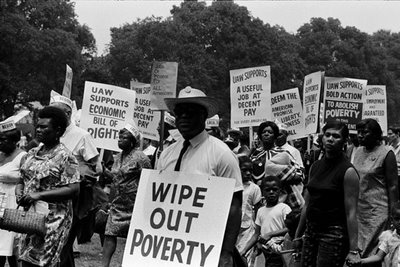
Many moderate civil rights leaders viewed this proposed boycott as unpatroitic, but Dr. King supported the young athletes 100%. Dr. King offered his unwavering support saying, "This is a protest and a struggle against racism and injustice and that is what we are working to eliminate in our organization and in our total struggle ... No one looking at these demands can ignore the truth of them. Freedom always demands sacrifice and ... they have the courage to say, 'We're going to be men and the United States of America have deprived us of our manhood, of our dignity and our native worth, and consequently we're going to stand up and make the sacrifices ..." By November 1967, Eugene McCarthy declares his candidacy for President, which was before Robert Kennedy doing it.
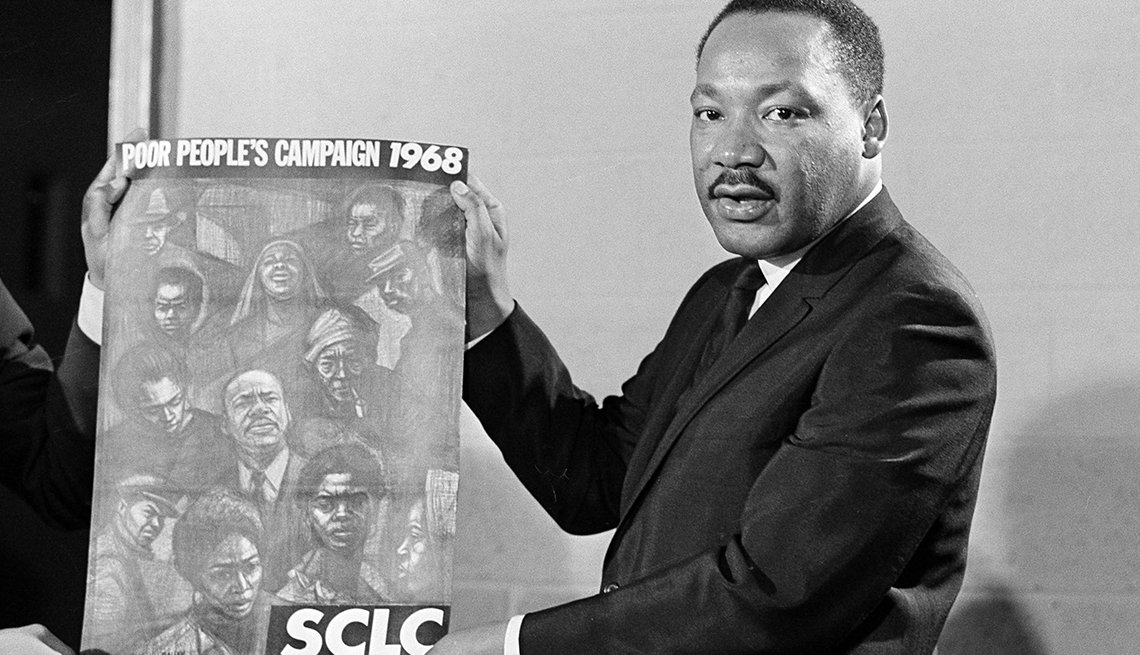
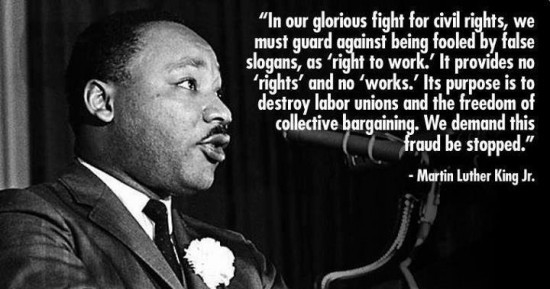
"...And the leaders of the world today talk eloquently about peace. Every time we drop our bombs in North Vietnam, President Johnson talks eloquently about peace. What is the problem? They are talking about peace as a distant goal, as an end we seek, but one day we must come to see that peace is not merely a distant goal we seek, but that it is a means by which we arrive at that goal. We must pursue peaceful ends through peaceful means. All of this is saying that, in the final analysis, means and ends must cohere because the end is preexistent in the means, and ultimately destructive means cannot bring about constructive ends.
Now let me say that the next thing we must be concerned about if we are to have peace on earth and good will toward men is the nonviolent affirmation of the sacredness of all human life. Every man is somebody because he is a child of God. And so when we say "Thou shalt not kill," we're really saying that human life is too sacred to be taken on the battlefields of the world. Man is more than a tiny vagary of whirling electrons or a wisp of smoke from a limitless smoldering. Man is a child of God, made in His image, and therefore must be respected as such. Until men see this everywhere, until nations see this everywhere, we will be fighting wars. One day somebody should remind us that, even though there may be political and ideological differences between us, the Vietnamese are our brothers, the Russians are our brothers, the Chinese are our brothers; and one day we've got to sit down together at the table of brotherhood. But in Christ there is neither Jew nor Gentile. In Christ there is neither male nor female. In Christ there is neither Communist nor capitalist. In Christ, somehow, there is neither bound nor free. We are all one in Christ Jesus. And when we truly believe in the sacredness of human personality, we won't exploit people, we won't trample over people with the iron feet of oppression, we won't kill anybody..."


Memphis and the Assassination of Dr. Martin Luther King Jr.
On January of 1968, in Atlanta, his staff celebrates his final Birthday on Earth as a thirty-nine year old man. Andrew Young is with him along with a black woman sending him a cup in a funny way to make light of the War on Poverty. He continues to try to gain funds for the Poor People's Campaign, but many of his closest advisers are skeptical of his plan. Some want to focus on voting, some want to deal with Operation Breadbasket, and some want to delay the march to Washington for months after April 1968. Yet, Dr. King is steadfast in working on his goals. Dorothy Cotton is one of his closet friends too. On February 4, 1968, Martin Luther King, Jr. preached ‘‘The Drum Major Instinct’’ from the pulpit of Ebenezer Baptist Church in Atlanta, Georgia. This was one of his great speeches and it would be two months before his assassination. In his speech, he outlined the great definition of leadership. Leadership is not about egoism, but Dr. King wanted to stress the point that the greatest leader is the person who serves the people and the interests of the people too. He used biblical imagery in his sermon and other concepts in conveying his message. For example, Dr. King described the life of Jesus Christ as a person who wasn't rich, was harmed, and he was rejected by many, but he was a great leader. The reason was that Jesus Christ served his community, helped the sick, and transformed the lives of fellow people in a great way with his compassion love for the human race.
Love being a powerful force can make a way to social renewal and a transformation of society. He also wanted his congregation to know that he was a drum major for justice, for peace, and for helping the hungry. He wanted to imagine if his funeral took place and people wanted to decipher his legacy. It was a sermon that wanted human beings to realize that material possessions are not more important than helping humanity in positive ways. On February 8, 1968, Dr. King was on Johnny Carson's The Tonight Show. Harry Belafonte is the host. Dr. King shows humors and talks about politics. Belafonte asks Dr. King does he fears for his life. Dr. King responds in the following words: "... I'm far more concerned about doing something for humanity and what I consider the will of God than longevity. Ultimately it isn't an important how long you live. The important thing is how well you live." He's right on that point. Afterwards, Dr. King traveled into Philadelphia and learns more about the Memphis sanitation strike in February 1968. At February of 1968, he also was in a preacher's conference in Miami.
On March 14, 1968, Dr. King takes a plane to Detroit and goes into the suburb of Grosse Point, Michigan. He gives a speech at Grosse Point high school. He speaks at the Human Relations Council. The audience is mostly white and many people don't like him. Protesters have signs that say "Traitor!" and "Commie!" because of his anti-Vietnam War stance. Many in the crowd heckle him, but he keeps his composure and gives his message. Rosa Parks was in attendance too. In his speech, he promotes racial justice, opposes the Vietnam War, he promotes the beauty of the color black, and desires social change. In the speech, he said the following words:
"...Secondly, we've got to get rid of two or three myths that still pervade our nation. One is the myth of time. I'm sure you've heard this notion. It is the notion that only time can solve the problem of racial injustice. And I've heard it from many sincere people. They've said to the negro and/to his allies in the white community you should slow up, you're pushing things too fast, only time can solve the problem. And if you'll just be nice and patient and continue to pray, in a hundred or two hundred years the problem will work itself out. There is an answer to that myth. It is the time is neutral. It can be used either constructively or destructively. And I'm sad to say to you tonight I'm absolutely convinced that the forces of ill will in our nation, the forces on the wrong side in our nation, the extreme righteous of our nation have often used time much more effectively than the forces of good will and it may well be that we may have to repent in this generation not merely for the vitriolic words of the bad people who will say bad things in a meeting like this or who will bomb a church in Birmingham, Alabama, but for the appalling silence and indifference of the good people who sit around and say wait on time. Somewhere we must come to see that human progress never rolls in on the wheels of inevitability, it comes through the tireless efforts and the persistent work of dedicated individuals who are willing to be co-workers with God and without this hard work time itself becomes an ally of the primitive forces of social stagnation. And so we must always help time and realize that the time is always right to do right..."
On January of 1968, in Atlanta, his staff celebrates his final Birthday on Earth as a thirty-nine year old man. Andrew Young is with him along with a black woman sending him a cup in a funny way to make light of the War on Poverty. He continues to try to gain funds for the Poor People's Campaign, but many of his closest advisers are skeptical of his plan. Some want to focus on voting, some want to deal with Operation Breadbasket, and some want to delay the march to Washington for months after April 1968. Yet, Dr. King is steadfast in working on his goals. Dorothy Cotton is one of his closet friends too. On February 4, 1968, Martin Luther King, Jr. preached ‘‘The Drum Major Instinct’’ from the pulpit of Ebenezer Baptist Church in Atlanta, Georgia. This was one of his great speeches and it would be two months before his assassination. In his speech, he outlined the great definition of leadership. Leadership is not about egoism, but Dr. King wanted to stress the point that the greatest leader is the person who serves the people and the interests of the people too. He used biblical imagery in his sermon and other concepts in conveying his message. For example, Dr. King described the life of Jesus Christ as a person who wasn't rich, was harmed, and he was rejected by many, but he was a great leader. The reason was that Jesus Christ served his community, helped the sick, and transformed the lives of fellow people in a great way with his compassion love for the human race.
Love being a powerful force can make a way to social renewal and a transformation of society. He also wanted his congregation to know that he was a drum major for justice, for peace, and for helping the hungry. He wanted to imagine if his funeral took place and people wanted to decipher his legacy. It was a sermon that wanted human beings to realize that material possessions are not more important than helping humanity in positive ways. On February 8, 1968, Dr. King was on Johnny Carson's The Tonight Show. Harry Belafonte is the host. Dr. King shows humors and talks about politics. Belafonte asks Dr. King does he fears for his life. Dr. King responds in the following words: "... I'm far more concerned about doing something for humanity and what I consider the will of God than longevity. Ultimately it isn't an important how long you live. The important thing is how well you live." He's right on that point. Afterwards, Dr. King traveled into Philadelphia and learns more about the Memphis sanitation strike in February 1968. At February of 1968, he also was in a preacher's conference in Miami.
On March 14, 1968, Dr. King takes a plane to Detroit and goes into the suburb of Grosse Point, Michigan. He gives a speech at Grosse Point high school. He speaks at the Human Relations Council. The audience is mostly white and many people don't like him. Protesters have signs that say "Traitor!" and "Commie!" because of his anti-Vietnam War stance. Many in the crowd heckle him, but he keeps his composure and gives his message. Rosa Parks was in attendance too. In his speech, he promotes racial justice, opposes the Vietnam War, he promotes the beauty of the color black, and desires social change. In the speech, he said the following words:
"...Secondly, we've got to get rid of two or three myths that still pervade our nation. One is the myth of time. I'm sure you've heard this notion. It is the notion that only time can solve the problem of racial injustice. And I've heard it from many sincere people. They've said to the negro and/to his allies in the white community you should slow up, you're pushing things too fast, only time can solve the problem. And if you'll just be nice and patient and continue to pray, in a hundred or two hundred years the problem will work itself out. There is an answer to that myth. It is the time is neutral. It can be used either constructively or destructively. And I'm sad to say to you tonight I'm absolutely convinced that the forces of ill will in our nation, the forces on the wrong side in our nation, the extreme righteous of our nation have often used time much more effectively than the forces of good will and it may well be that we may have to repent in this generation not merely for the vitriolic words of the bad people who will say bad things in a meeting like this or who will bomb a church in Birmingham, Alabama, but for the appalling silence and indifference of the good people who sit around and say wait on time. Somewhere we must come to see that human progress never rolls in on the wheels of inevitability, it comes through the tireless efforts and the persistent work of dedicated individuals who are willing to be co-workers with God and without this hard work time itself becomes an ally of the primitive forces of social stagnation. And so we must always help time and realize that the time is always right to do right..."
In March of 1968, he is involved in supporting striking sanitation workers in Memphis, TN. The Memphis sanitation workers movement inspired him and he spoke out in favor of labor rights. The March 28, 1968 demonstration ended when the atmosphere was filled with violence, property being damaged, and police brutality. A 16 year old teenage boy was killed by the police. Businesses had their windows broken. Tear gas was everywhere. Dr. Martin Luther King Jr. was falsely scapegoated for the violence by reactionary politicians like Robert Byrd of West Virginia and many in the media. Dr. King was rushed from the scene. Yet, he promised to make another peaceful march in Memphis. He was very depressed during this time, because he felt that his actions could do little to resolve the Memphis sanitation workers' strike. He showed his melancholy attitude to his closest friends. Yet, he never gave up and he continued in his cause of nonviolence and social justice.
On March 30, 1968, he and his advisers had an emergency meeting at the Ebeneezer Baptist Church in Atlanta. Many of his advisers wanted to focus on opposing the Vietnam War. Some wanted to focus on the Operation Breadbasket Campaign. Others wanted to end the Memphis involvement. Dr. Martin Luther King Jr. decided to continue to be involved in the Memphis movement for labor rights. Dr. King believed that if the Memphis sanitation protest was successful then that would cause a higher level of success for the Poor Peoples Campaign. On Sunday of March 31, 1968, Dr. Martin Luther King Jr. gave his historic speech in the National Cathedral in Washington, D.C. It is called, "Remaining Awake Through a Great Revolution." It was an eloquent sermon and speech that discussed about a diversity of issues. The speech wanted to oppose the Horatio Alger myth that a bootless man must get up by his own bootstrap to survive. It desires to support the revolutionary movements of Africa, Asia, and Latin America. It wanted an end to the unjust Vietnam War and a promotion of the Poor Peoples Campaign (in defeating poverty and having a radical redistribution of wealth). He expressed empathy to the suffering of the poor in Marks, Mississippi, in Africa, in Asia, and in Latin America. In that speech, Dr. King was very emotional and wanted to lift his spirits and the spirits of his audience in that historic church.

On April 3, 1968, he spoke at an evening rally at Mason Temple in Memphis. Ralph Abernathy called Dr. King from the Lorraine Hotel in order for him to come into the Temple. He gave his final speech entitled, “I’ve Been to the Mountaintop.” In that speech, he talked about history, boycotts, the dignity of the sanitation workers, and carrying on the struggle. Also, Dr. Martin Luther King Jr. advocated building up black institutions in that great speech too. The speech galvanized the crowd. He was emotional and excited at the future. During his speech, Dr. King said the following words:
"...Now we've got to go on in Memphis just like that. I call upon you to be with us when we go out Monday. (Yes) Now about injunctions. We have an injunction and we're going into court tomorrow morning (Go ahead) to fight this illegal, unconstitutional injunction. All we say to America is to be true to what you said on paper. [Applause] If I lived in China or even Russia, or any totalitarian country, maybe I could understand some of these illegal injunctions. Maybe I could understand the denial of certain basic First Amendment privileges, because they haven't committed themselves to that over there. But somewhere I read of the freedom of assembly. Somewhere I read (Yes) of the freedom of speech. (Yes) Somewhere I read (All right) of the freedom of press. (Yes) Somewhere I read (Yes) that the greatness of America is the right to protest for right. [Applause] And so just as I say we aren't going to let any dogs or water hoses turn us around, we aren't going to let any injunction turn us around. [Applause] We are going on. We need all of you..Now not only that, we've got to strengthen black institutions. (That's right, Yeah) I call upon you to take your money out of the banks downtown and deposit your money in Tri-State Bank. (Yeah) [Applause] We want a "bank-in" movement in Memphis. (Yes) Go by the savings and loan association.
I'm not asking you something that we don't do ourselves in SCLC. Judge Hooks and others will tell you that we have an account here in the savings and loan association from the Southern Christian Leadership Conference. We are telling you to follow what we're doing, put your money there. [Applause] You have six or seven black insurance companies here in the city of Memphis. Take out your insurance there. We want to have an "insurance-in." [Applause] Now these are some practical things that we can do. We begin the process of building a greater economic base, and at the same time, we are putting pressure where it really hurts. (There you go) And I ask you to follow through here. [Applause]...And they were telling me. [Applause] Now it doesn't matter now. (Go ahead) It really doesn't matter what happens now. I left Atlanta this morning, and as we got started on the plane–there were six of us–the pilot said over the public address system: "We are sorry for the delay, but we have Dr. Martin Luther King on the plane. And to be sure that all of the bags were checked, and to be sure that nothing would be wrong on the plane, we had to check out everything carefully. And we've had the plane protected and guarded all night."
And then I got into Memphis. And some began to say the threats, or talk about the threats that were out (Yeah), or what would happen to me from some of our sick white brothers.
Well, I don't know what will happen now; we've got some difficult days ahead. (Amen) But it really doesn't matter to with me now, because I've been to the mountaintop. (Yeah) [Applause] And I don't mind. [Applause continues] Like anybody, I would like to live a long life–longevity has its place. But I'm not concerned about that now. I just want to do God's will. (Yeah) And He's allowed me to go up to the mountain. (Go ahead) And I've looked over (Yes sir), and I've seen the Promised Land. (Go ahead) I may not get there with you. (Go ahead) But I want you to know tonight (Yes), that we, as a people, will get to the Promised Land. [Applause] (Go ahead, Go ahead) And so I'm happy tonight; I'm not worried about anything; I'm not fearing any man. Mine eyes have seen the glory of the coming of the Lord. [Applause]..."
After his great speech, Dr. King meets with his brother, A.D. King, and Kentucky state senator Georgia Davis. The day of April 4th started with Dr. King feeling joyful. He talks with friends. He gave his secretary Dora McDonald an idea about his future sermon in Atlanta on "Why America may go to hell." He calls his relatives. He feels that victory is imminent involving the Memphis sanitation strike. Dr. King plans to eat dinner with his advisers and friends. He stands on the balcony and talks with Jesse Jackson. On April 4, 1968, he was murdered by one bullet while he was standing on the balcony of the Lorraine motel in Memphis. The bullet came from a rifle and it hit his jaw. He was only 39 years old. The nation mourns and cities throughout America experience massive rebellions (which are the largest since the Civil War in over 100 cities).
He was buried in Atlanta on April 9, 1968. James Earl Ray was arrested in London by authorities and he was convicted. Questions abound about how he received a passport and money to travel from America to Canada, and then to the UK in such a short span of time when he was a poor convict. That is why many people (including the family of Dr. Martin Luther King Jr.) believe that a conspiracy involved the assassination of Dr. King. We know that the FBI and the NSA illegally and unjustly monitored Dr. King constantly. A historic 1999 court case found the government complicit in the assassination of Dr. Martin Luther King Jr. President Johnson signed the Civil rights Act of 1968 on April 10, 1968, which prohibited discrimination concerning the sale, rental, and financing of housing based on race, religion, national origin. It also made it a federal crime to "by force or by threat of force, injure, intimidate, or interfere with anyone … by reason of their race, color, religion, or national origin."
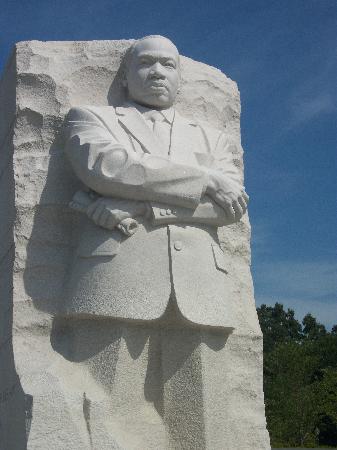

Legacy
Years later, we see some progress, but we have a long way to go. We see the rise of the black middle class and the black wealthy (some of the rich have unfortunately mocked the poor and refuse to develop a class analysis on issues), but income inequality has grown since 1968. We still have massive poverty (which is why the Fight for 15 movement is in existence today), struggling schools, the mass incarceration state, sexism, health care issues, environmental problems, imperialism, and policy brutality in the world. Dr. Martin Luther King Jr. was much more than the "I Have a Dream Speech." Dr. Martin Luther King Jr. was a revolutionary, radical person. He criticized capitalism, he condemned white racism, he opposed the death penalty, he wanted total nuclear disarmament worldwide, and he believed in social justice. If Dr. Martin Luther King Jr. was alive today, he would call out the corporate mainstream media, Donald Trump, Mitt Romney, and other reactionary extremists. Dr. King said that Black is Beautiful in public. He said the following words in a rare speech:
"Somebody told a lie one day. They couched it in language. They made everything Black ugly and evil. Look in your dictionaries and see the synonyms of the word black. It’s always something degrading and low and sinister. Look at the word white, it’s always something pure, high and clean. Well I want to get the language right tonight. "I want to get the language so right that everyone here will cry out: ‘Yes, I’m Black, I’m proud of it. I’m Black and I’m beautiful.”
With the events in Iran with the Americans going home, it shows that peaceful diplomacy can cause positive results in international affairs. Dr. Martin Luther King Jr. taught us that love, tolerance, and nonviolent actions are not weak actions. They are stridently powerful deeds which have historically enriched the lives of the human race. We believe in justice for the poor. Mutual cooperation, anti-imperialism, and helping the poor are strong concepts and strong actions that should be executed in order to make the world better. The current Resistance movement is a further example of progressive heroes continuing the aim of making the Dream into a reality. Dr. King wanted peace and goodwill to exist in the world. No human is perfect and Dr. King admitted his imperfections, but God wants us to learn from others so we can be better people overall. Dr. Martin Luther King Jr. was right to advocate for economic justice. He was right to advance love for humanity. He was right in opposing Jim Crow apartheid. He was right to oppose the unjust Vietnam War. One of his greatest accomplishments was his articulation of the concept of love in powerful, eloquent, and real terms. He showed the world that Love is not a weak force, but a strong force which can develop social change in the midst of oppression. That is why we believe in Love since Love can harbor the influence to establish true peace and justice. So, we are inspired by Dr. Martin Luther King.
We will work in service and social activism, so the Dream can be made real for all.
By Timothy
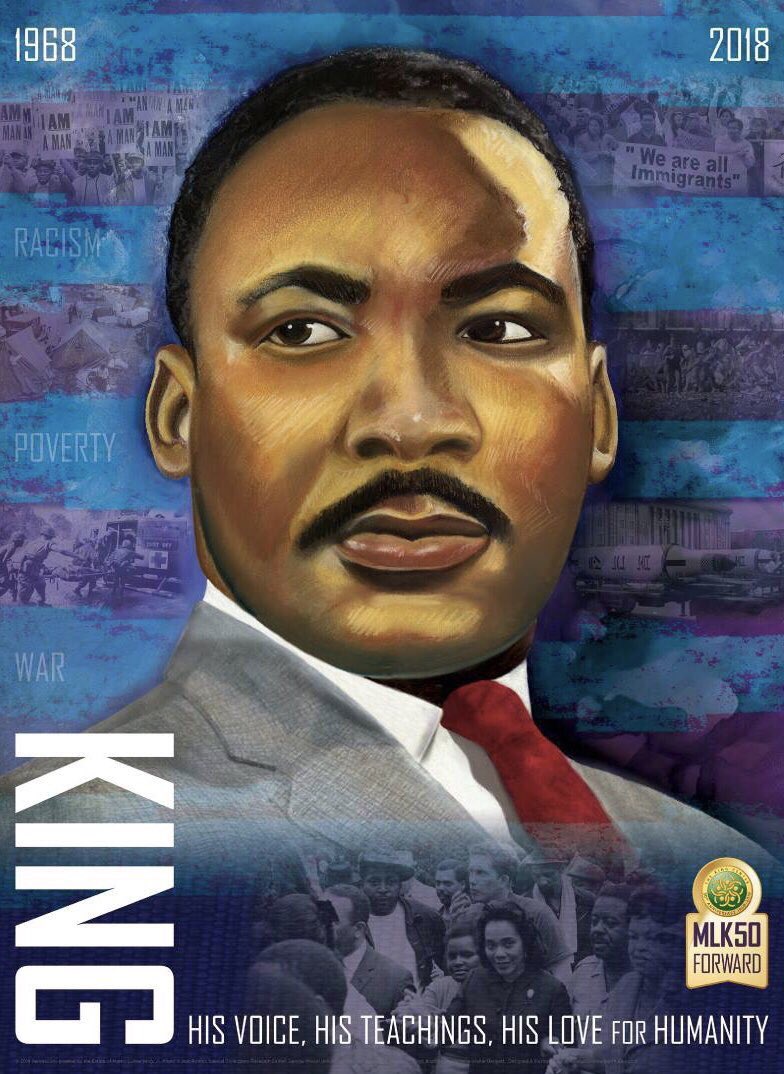
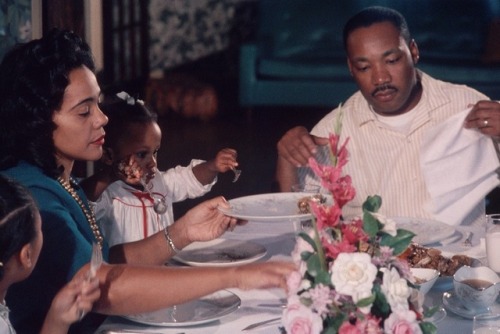
Rest in Power Brother Dr. Martin Luther King Jr.
This same information with extra details of great information is found at the following link:
https://www.scribd.com/document/372473057/Dr-Martin-Luther-King-Jr-After-50-Years
https://drive.google.com/file/d/1gY-EVzrhJJDTVQnG8BWdvd3kFJypxlaS/view?usp=sharing
No comments:
Post a Comment